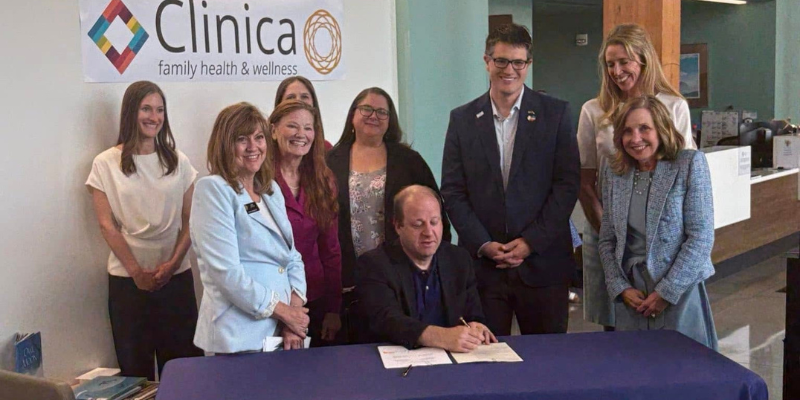In late May, Gov. Jared Polis signed Senate Bill 25-289 into law which establishes Colorado’s drug donation program, a revolutionary new law that will let people donate their unused and unopened prescription drugs so that other patients can access them for free or a minimal cost. Dr. Gina Moore, Senior Associate Dean for Operations and Regulatory Affairs, tirelessly worked with the Colorado Pharmacists Society to advocate for the new law, which will open doors to individuals who previously could not afford their medications.
“Every year, the United States spends billions to dispose of unused prescription medicines from nursing homes, assisted living residences, hospices, and jails,” bill sponsor Sen. Lisa Cutter, said in a statement. “Additionally, many left-over prescriptions are flushed down the toilet or thrown into the trash, which causes immeasurable harm to our environment and water supply. With this new law, we are creating a program to reduce waste, protect the environment, and help Coloradans access the medication they need.”
We caught up with Dr. Moore to learn why this law is important to Colorado’s health and environment.

What inspired you to champion SB25-289 and advocate for a statewide drug donation program in Colorado?
In 2022, the Colorado legislature passed Senate Bill 22-098 which called for a task force to exam drug repository programs across the country to determine the best model to explore for implementation in Colorado. I was honored to lead that task force in which we made specific recommendations to the state regarding funding, medications to be included (and excluded) from a drug donation program, record keeping, program costs, and marketing. Due to the current budget challenges in our state, this year’s bill (SB25-289) did not include the infrastructure provisions to fully develop a robust program, but it does include the basic provisions of drug donation and repurposing of unused medications. I am very hopeful non-profit organizations in our state will take advantage of this new legislation and be willing to accept donated medications and re-dispense those medications to Colorado citizens in need. We know that approximately 10% of Colorado citizens are unable to fill a prescription due to cost. If we can help a portion of those individuals, that is a win.
How will this law improve access to medications for underinsured and underserved communities in our state?
The bill defines an eligible patient as an individual with a need for donated medicine who is indigent, uninsured, or underinsured, but also includes others who have a need for donated medicine. Medicaid patients receive their medications at no cost. The individuals we hope this program serves are people who might have a high-deductible plan or no health care insurance at all. We know of individuals who might face $100 co-pays each month for their medications. If they are on a couple of chronic medications, those costs add up and may result in people needing to choose between food and medicine. Keep in mind that not all medications will be available through these programs, and we are also reliant upon donations and organizations willing to establish this type of program.
What were some of the biggest challenges you faced in getting this legislation passed, and how did you overcome them?
By far the biggest hurdle was paying for this program. A robust program in which there is an infrastructure for donation locations and a pharmacy from which medications could be mailed to people across our state would cost at least $600,000 annually. We took out the infrastructure and put into place laws that will allow for safe donation and reuse of medications. We are hopeful that non-profit organizations and perhaps others will take advantage of these new regulations that will avoid perfectly fine medications to not go to waste.
In what ways can pharmacists and the public get involved to support or participate in this new program?
We would like to see a few non-profits take advantage of these new regulations. Open Bible Church in Colorado Springs has a drug donation program that can hopefully grow because of this bill. Perhaps we can get a student pharmacy group to champion this opportunity as well.
Looking ahead, what impact do you hope this program will have on reducing medication waste and improving public health in Colorado?
I very much hope we will see medications that people no longer need donated to individuals who can use them. Many times, unused medications are thrown away and wind up in our water supply or landfill. If we can avoid medicines ending up contaminating our land and water, that is a huge win as well.




